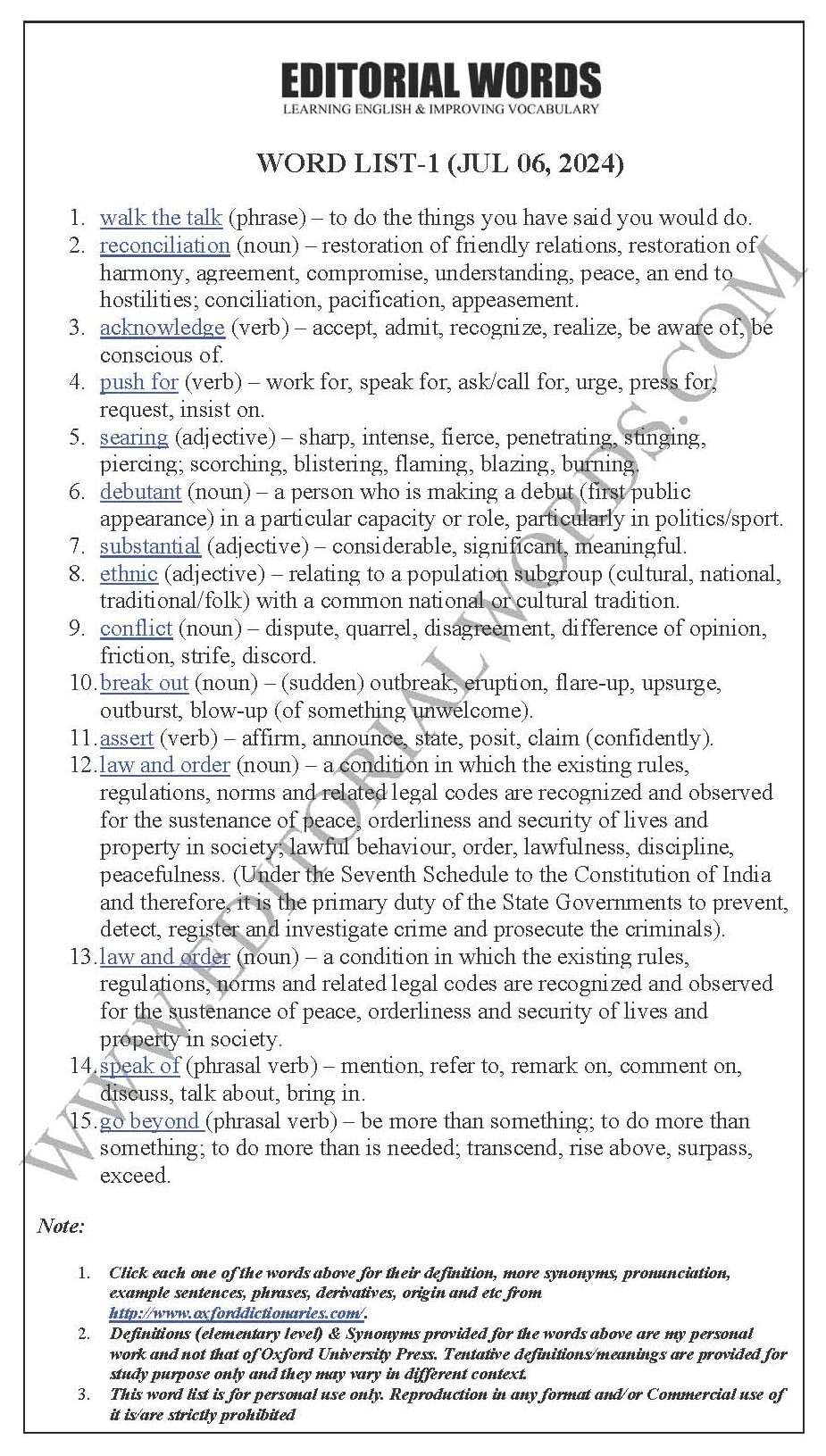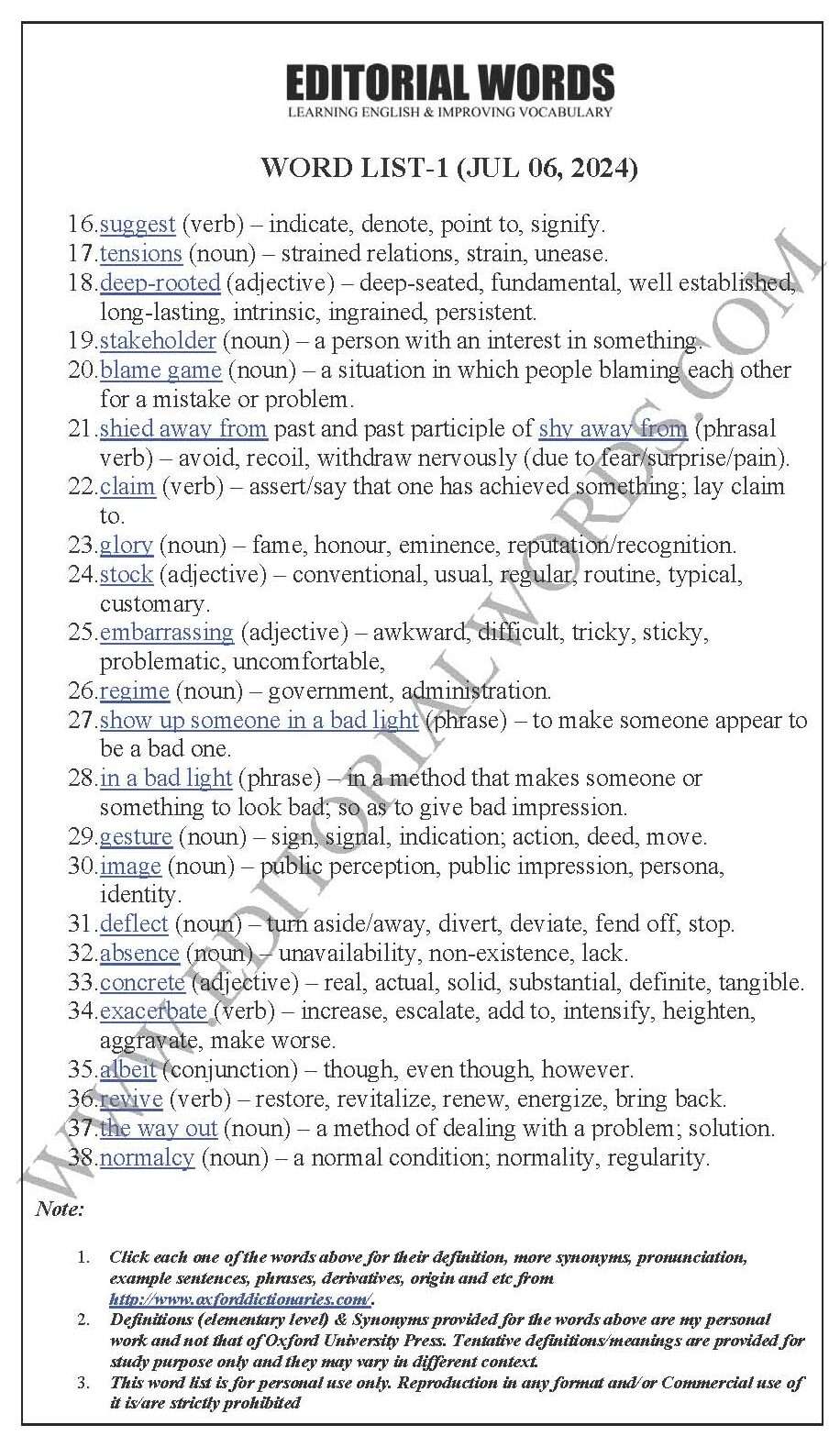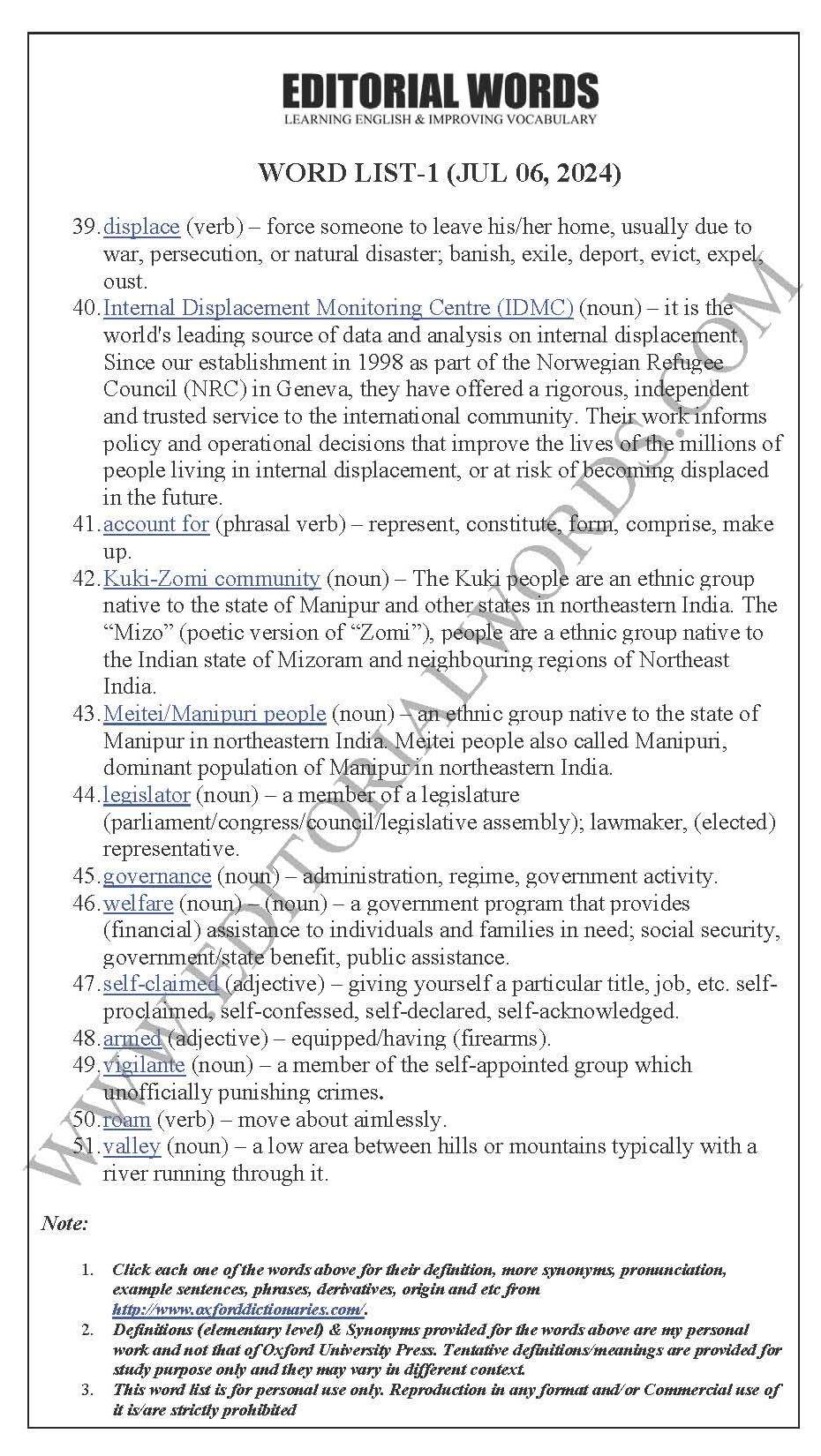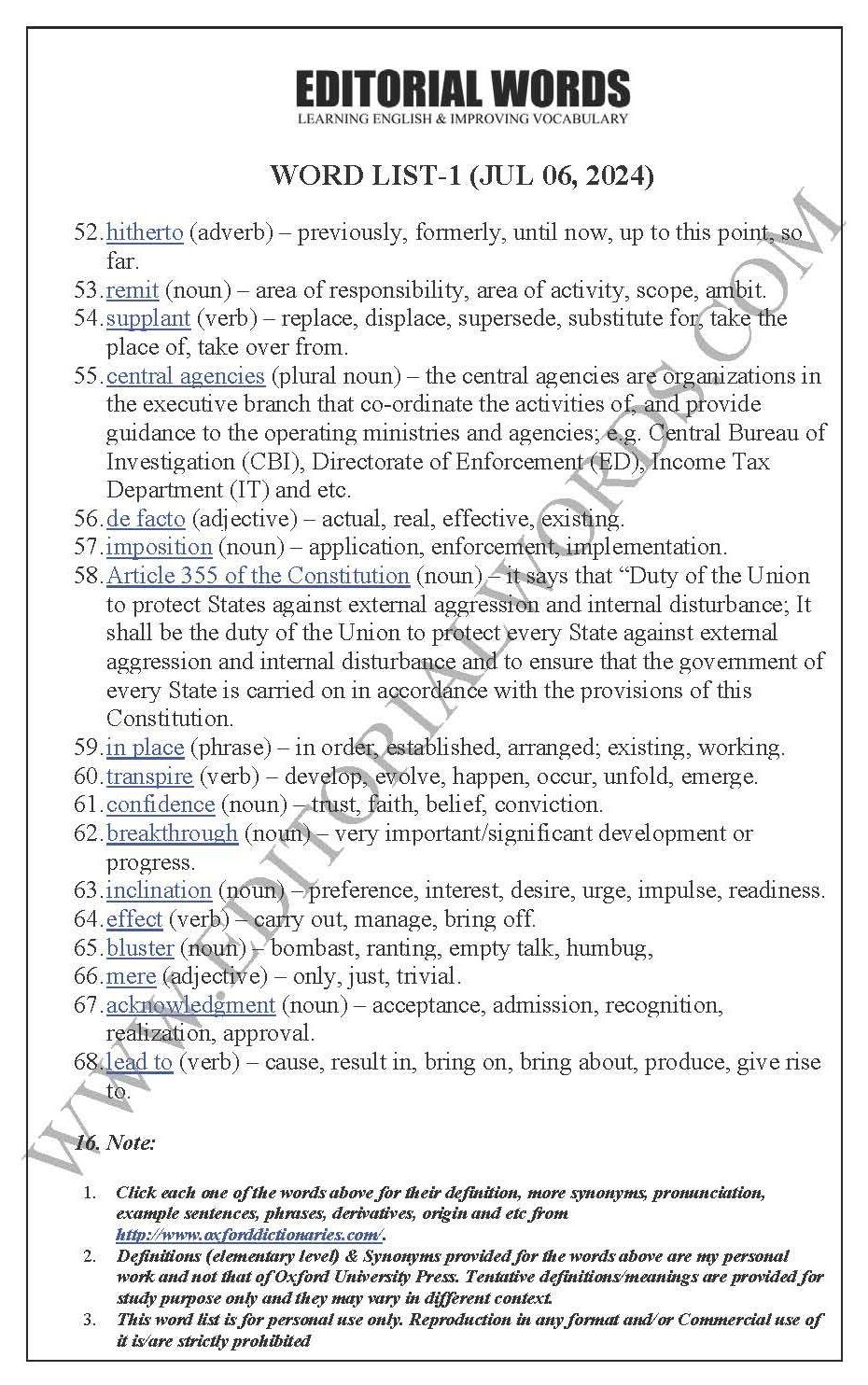The Hindu Editorial (Walk the talk) – Jul 06, 2024
To read this article, click “The Hindu”.
This preview is provided here with permission.
Courtesy: The Hindu
The Hindu Editorial (Walk the talk) – Jul 06, 2024:
- walk the talk (phrase) – to do the things you have said you would do.
- reconciliation (noun) – restoration of friendly relations, restoration of harmony, agreement, compromise, understanding, peace, an end to hostilities; conciliation, pacification, appeasement.
- acknowledge (verb) – accept, admit, recognize, realize, be aware of, be conscious of.
- push for (verb) – work for, speak for, ask/call for, urge, press for, request, insist on.
- searing (adjective) – sharp, intense, fierce, penetrating, stinging, piercing; scorching, blistering, flaming, blazing, burning.
- debutant (noun) – a person who is making a debut (first public appearance) in a particular capacity or role, particularly in politics/sport.
- substantial (adjective) – considerable, significant, meaningful.
- ethnic (adjective) – relating to a population subgroup (cultural, national, traditional/folk) with a common national or cultural tradition.
- conflict (noun) – dispute, quarrel, disagreement, difference of opinion, friction, strife, discord.
- break out (noun) – (sudden) outbreak, eruption, flare-up, upsurge, outburst, blow-up (of something unwelcome).
- assert (verb) – affirm, announce, state, posit, claim (confidently).
- law and order (noun) – a condition in which the existing rules, regulations, norms and related legal codes are recognized and observed for the sustenance of peace, orderliness and security of lives and property in society; lawful behaviour, order, lawfulness, discipline, peacefulness. (Under the Seventh Schedule to the Constitution of India and therefore, it is the primary duty of the State Governments to prevent, detect, register and investigate crime and prosecute the criminals).
- law and order (noun) – a condition in which the existing rules, regulations, norms and related legal codes are recognized and observed for the sustenance of peace, orderliness and security of lives and property in society.
- speak of (phrasal verb) – mention, refer to, remark on, comment on, discuss, talk about, bring in.
- go beyond (phrasal verb) – be more than something; to do more than something; to do more than is needed; transcend, rise above, surpass, exceed.
- suggest (verb) – indicate, denote, point to, signify.
- tensions (noun) – strained relations, strain, unease.
- deep-rooted (adjective) – deep-seated, fundamental, well established, long-lasting, intrinsic, ingrained, persistent.
- stakeholder (noun) – a person with an interest in something.
- blame game (noun) – a situation in which people blaming each other for a mistake or problem.
- shied away from past and past participle of shy away from (phrasal verb) – avoid, recoil, withdraw nervously (due to fear/surprise/pain).
- claim (verb) – assert/say that one has achieved something; lay claim to.
- glory (noun) – fame, honour, eminence, reputation/recognition.
- stock (adjective) – conventional, usual, regular, routine, typical, customary.
- embarrassing (adjective) – awkward, difficult, tricky, sticky, problematic, uncomfortable,
- regime (noun) – government, administration.
- show up someone in a bad light (phrase) – to make someone appear to be a bad one.
- in a bad light (phrase) – in a method that makes someone or something to look bad; so as to give bad impression.
- gesture (noun) – sign, signal, indication; action, deed, move.
- image (noun) – public perception, public impression, persona, identity.
- deflect (noun) – turn aside/away, divert, deviate, fend off, stop.
- absence (noun) – unavailability, non-existence, lack.
- concrete (adjective) – real, actual, solid, substantial, definite, tangible.
- exacerbate (verb) – increase, escalate, add to, intensify, heighten, aggravate, make worse.
- albeit (conjunction) – though, even though, however.
- revive (verb) – restore, revitalize, renew, energize, bring back.
- the way out (noun) – a method of dealing with a problem; solution.
- normalcy (noun) – a normal condition; normality, regularity.
- displace (verb) – force someone to leave his/her home, usually due to war, persecution, or natural disaster; banish, exile, deport, evict, expel, oust.
- Internal Displacement Monitoring Centre (IDMC) (noun) – it is the world’s leading source of data and analysis on internal displacement. Since our establishment in 1998 as part of the Norwegian Refugee Council (NRC) in Geneva, they have offered a rigorous, independent and trusted service to the international community. Their work informs policy and operational decisions that improve the lives of the millions of people living in internal displacement, or at risk of becoming displaced in the future.
- account for (phrasal verb) – represent, constitute, form, comprise, make up.
- Kuki-Zomi community (noun) – The Kuki people are an ethnic group native to the state of Manipur and other states in northeastern India. The “Mizo” (poetic version of “Zomi”), people are a ethnic group native to the Indian state of Mizoram and neighbouring regions of Northeast India.
- Meitei/Manipuri people (noun) – an ethnic group native to the state of Manipur in northeastern India. Meitei people also called Manipuri, dominant population of Manipur in northeastern India.
- legislator (noun) – a member of a legislature (parliament/congress/council/legislative assembly); lawmaker, (elected) representative.
- governance (noun) – administration, regime, government activity.
- welfare (noun) – (noun) – a government program that provides (financial) assistance to individuals and families in need; social security, government/state benefit, public assistance.
- self-claimed (adjective) – giving yourself a particular title, job, etc. self-proclaimed, self-confessed, self-declared, self-acknowledged.
- armed (adjective) – equipped/having (firearms).
- vigilante (noun) – a member of the self-appointed group which unofficially punishing crimes.
- roam (verb) – move about aimlessly.
- valley (noun) – a low area between hills or mountains typically with a river running through it.
- hitherto (adverb) – previously, formerly, until now, up to this point, so far.
- remit (noun) – area of responsibility, area of activity, scope, ambit.
- supplant (verb) – replace, displace, supersede, substitute for, take the place of, take over from.
- central agencies (plural noun) – the central agencies are organizations in the executive branch that co-ordinate the activities of, and provide guidance to the operating ministries and agencies; e.g. Central Bureau of Investigation (CBI), Directorate of Enforcement (ED), Income Tax Department (IT) and etc.
- de facto (adjective) – actual, real, effective, existing.
- imposition (noun) – application, enforcement, implementation.
- Article 355 of the Constitution (noun) – it says that “Duty of the Union to protect States against external aggression and internal disturbance; It shall be the duty of the Union to protect every State against external aggression and internal disturbance and to ensure that the government of every State is carried on in accordance with the provisions of this Constitution.
- in place (phrase) – in order, established, arranged; existing, working.
- transpire (verb) – develop, evolve, happen, occur, unfold, emerge.
- confidence (noun) – trust, faith, belief, conviction.
- breakthrough (noun) – very important/significant development or progress.
- inclination (noun) – preference, interest, desire, urge, impulse, readiness.
- effect (verb) – carry out, manage, bring off.
- bluster (noun) – bombast, ranting, empty talk, humbug,
- mere (adjective) – only, just, trivial.
- acknowledgment (noun) – acceptance, admission, recognition, realization, approval.
- lead to (verb) – cause, result in, bring on, bring about, produce, give rise to.
Note :
1. Click each one of the words above for their definition, more synonyms, pronunciation, example sentences, phrases, derivatives, origin and etc. from http://www.oxforddictionaries.com/.
2. Definitions (elementary level) & Synonyms provided for the words above are my personal work and not that of Oxford University Press. Tentative definitions/meanings are provided for study purposes only and they may vary in a different context.
3. This word list is for personal use only. Reproduction in any format and/or Commercial use of it is/are strictly prohibited.
The Hindu Editorial (Walk the talk) – Jul 06, 2024:




“Phrasal Verbs” We Learnt Last Week
“Idioms & Phrases” We Learnt Last Week
“Important Definitions” We Learnt Last Week
Recent Word Lists For The Hindu Editorial Articles

A day after a searing speech by debutant Congress Member of Parliament, Bimol Akoijam, who questioned Prime Minister Narendra Modi’s silence on the situation in Manipur,… For further reading, visit “The Hindu”. Below is today’s word list-1 for The Hindu Editorial (Walk the talk) – Jul 06, 2024.